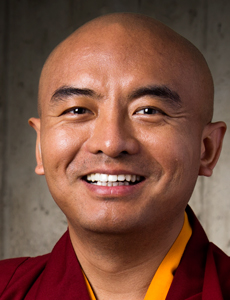Very Venerable Yongey Mingyur Rinpoche

Born in 1975 in the Himalayan border regions between Tibet and Nepal, Yongey Mingyur Rinpoche is a much-loved and accomplished meditation master. From a young age, Rinpoche was drawn to a life of contemplation. He spent many years of his childhood in strict retreat. At the age of seventeen, he was invited to be a teacher at his monastery�s three-year retreat center, a position rarely held by such a young lama. He also completed the traditional Buddhist training in philosophy and psychology, before founding a monastic college at his home monastery in north India.
In addition to extensive training in the meditative and philosophical traditions of Tibetan Buddhism, Mingyur Rinpoche has also had a lifelong interest in Western science and psychology. At an early age, he began a series of informal discussions with the famed neuroscientist Francisco Varela, who came to Nepal to learn meditation from his father, Tulku Urgyen Rinpoche. Many years later, in 2002, Mingyur Rinpoche and a handful of other long-term meditators were invited to the Waisman Laboratory for Brain Imaging and Behavior at the University of Wisconsin-Madison, where Richard Davidson, Antoine Lutz, and other scientists examined the effects of meditation on the brains of advanced meditators. The results of this groundbreaking research were reported in many of the world�s most widely read publications, including National Geographic and Time.
Mingyur Rinpoche teaches throughout the world, with centers on five continents. His candid, often humorous accounts of his own personal difficulties have endeared him to thousands of students around the world. His best-selling book, The Joy of Living: Unlocking the Secret and Science of Happiness, debuted on the New York Times bestseller list and has been translated into over twenty languages. Rinpoche�s most recent books are Turning Confusion into Clarity: A Guide to the Foundation Practices of Tibetan Buddhism, Joyful Wisdom: Embracing Change and Finding Freedom, and an illustrated children�s book entitled Ziji: The Puppy that Learned to Meditate.
In early June, 2011, Mingyur Rinpoche walked out of his monastery in Bodhgaya, India and began a �wandering retreat� through the Himalayas and the plains of India that lasted four and a half years. When not attending to the monasteries under his care in India and Nepal, Rinpoche spends time each year traveling and teaching worldwide.

